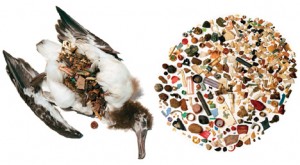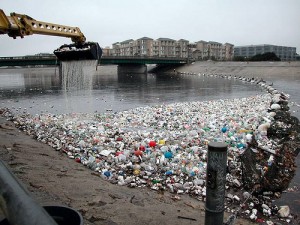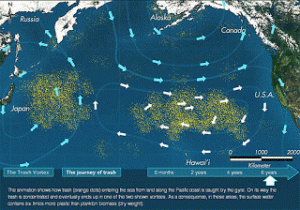Sounds tasty, doesn’t it? Well, it’s as horrible as it sounds; an ocean’s surface is covered in plastic, and much more plastic is in its depths: plastic as a whole, in six-pack holders for cans, plastic bags, and lighters floating somewhere in the Pacific. Also, some plastic has sunk to the depths of the ocean, and some of it manages to degrade into small molecules, either plastic, or coming from detergents, or shampoo, or much much more that we cannot even imagine. Sounds like a horror film? Well the production was not Hollywood’s, but humanity’s as a whole!
Due to the way humanity consumes and uses plastic in its everyday life, plastic has managed to either go down the drains, or fly over many countries in the case of a plastic bag, reaching bodies of water that eventually dump everything into our oceans! After many years, the plastic has been taken by the currents and formed two huge garbage dumps in the Pacific – one between Hawaii and California, and another between Hawaii and Japan.
This was the subject of conversation of Environmental Working Group’s (EnWG) latest social meeting, taking place on February the 24th, inviting many members to ask questions, and also add to the information already existing. But how exactly is plastic soup caused by us humans? We choose to consume plastic, even if the basic product is not. The containers and the packaging is most of the time plastic. Here are a few to name:
- Plastic bag and solid plastics: flies through the air or tumbles, and reaches any kind of body of water, eventually finding its way to our seas and oceans.
- Shampoos and detergents: going down the drain, and we all know that everything that goes down our drains reaches the ocean.
Once in the ocean, it takes centuries for it to be broken down into particles. This then creates a beautiful image of an ocean full of plastic and human waste. You know what comes next I imagine: animals and their daily swim in those vast parts of the ocean. They manage to entangle themselves in it, or eat the particles, which are also harmful, giving you yummy and tasty meat and harming your health.
We came to many outcomes, and after discussing how to prevent it as much as possible, we all came to the following conclusions of what we should do:
- Educating and raising awareness
- Consuming eco-friendly products
- Individual action, like reusing plastic bags and not littering
- Discarding traditional consumption habits, and reducing the consumption of plastic products
Is there a single soul out there that is OK with the existence of Plastic Soup? Let’s hope for the sake of this planet, and for our own health, that we manage to reduce and eliminate the Plastic Soup and its formation! Because the consequences are too many to even think about…
Special thanks to our external speaker at the meeting, Aris Telonis.
John Eikosidekas, Human Resources Responsible of the EnWG




